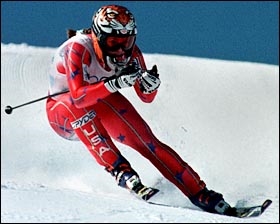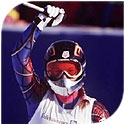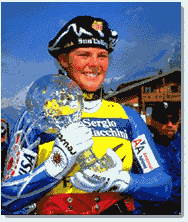To me, a hero is someone who does not give up and never stops fighting for what they believe in. A hero is someone who people look up to and admire for their strength and accomplishments. Picabo Street is my hero.
 |
| Picabo Skiing (http://www.washingtonpost.com/ wp-srv/sports/longterm/olympics1998/recap/day5.htm) |
Picabo was born on April 3, 1971 in a rural town in Idaho to Ronald and Dee Street. Her family lived too far away from a hospital for a proper delivery, so she was born in her parents' small house. For her first few minutes on earth, her body was a bright blue color because she was not getting enough oxygen. Her father quickly blew into her mouth and supplied her lungs with the adequate amount of oxygen. Soon after, Picabo was a healthy color and her breathing was under control. "I had to give her her first breath, and I let her go from there," said Ron, Picabo's father, as he reminisced about her independent and free spirit.
Soon after Picabo was born, her parents searched for just the right place to raise her and her older brother. They found it in Triumph, Idaho: Population 35. They thought that their children would learn to rely more on themselves in a smaller town than in a bigger and less family-like one. Being the free spirits that they were, Ron and Dee wanted their children to be able to choose their own names. Picabo's birth certificate read "baby girl" and her brother's "baby boy." Picabo received her name from the Shoshone and Bannock Indian languages where it means "shiny water" or "silver creek." Also, as an infant, she enjoyed the classic childhood game of "peekaboo." However, Picabo has another idea of how she received her name. "They [my parents] had an idea I was an unusual person and figured, 'She's weird, we might as well give her a strange name.'"
 |
| Victory! (http://www.active.com/ story.cfm?story_id=5641) |
Picabo spent the next few years training, racing, and competing. She stayed strong and focused on skiing. Still having slight troubles with her knee, she managed to win four gold medals, five silvers, and two bronzes all over the world. This showed that all of her hard work and determination had finally paid off. She traveled from Japan to South America and was ranked number one in the overall northern American standings two years in a row. In 1997, she became the first woman ever to win a world cup. I think it is amazing how she showed everyone that women could be good athletes too and that men weren't the only strong ones. Even with an injury, she managed to succeed. "What If I had stayed healthy and kept [beating] everybody? Then I'd go to the Olympics and people would say, 'Oh, boy. Picabo won again.' But now people can look at me and say, 'Wow, she came back really fast from this knee injury and she's up there again. How spectacular is that?'"
In 2005, Picabo was added to the National Ski Hall of fame. Now retired, Picabo resides in her home outside Portland, Oregon. She still skis regularly and travels with her mother to special events.
Picabo never gave up on her dream and stayed persistent throughout many injuries. She knew what she wanted as a little child and did everything that she was capable of to make her dream come true. This is why she is my hero. She worked hard and became the first female to ever win a world cup. Her family supported her greatly, and with her relentless personality, her dreams came true. "Nobody needs to prove to anybody what they're worthy of, just the person that they look at in the mirror. That's the only person you need to answer to." - Picabo Street.
 |
| Holding her prize (http://www.snoweb.com/gifs/picabo.gif) |
As her name might hint, Picabo did have a wild and carefree personality. For most of her childhood years she hated her name but then grew to love the untamed image it gave her. Being the only girl of only seven children in her town, Picabo quickly developed a fearless personality that set her apart from most girls her age. "Kids would ask, 'do you have a doll?' I'd say, 'No, I have a BB gun.'" This is one of the reasons why I admire Picabo. She was not afraid to be different and did not care what others thought of her.
Picabo's first time on skis was when she was five years old. She screamed and cried the whole time for fear that she would fall off the chair lift. Once at the top of the mountain, she quickly raced down, passing her brother and father. Picabo might have been afraid in the beginning, but she quickly learned to set her fears aside. I think this trait is a very important one and I admire her fearlessness and perseverance. From that day on, Picabo was hooked on skiing. Her family lived only twelve miles away from Sun Valley, a very large ski resort on the Sawtooth Mountain Range, so she was out about twice a week. Her school also had a ski team that she actively participated in. When Picabo was six years old, she entered in a competition for young skiers and won. This is when she realized that not only was she a talented skier, but she was also a winner. When Picabo was thirteen years old, in 1984, she watched the winter Olympics on television for the first time in Sarajevo, Yugoslavia. Five American skiers won medals that year. A woman named Christian Cooper from Picabo's hometown won a gold and a silver; she was Picabo�s hero.
After that winter Olympics, Picabo told her father that she was going to win a medal one day. She knew what she wanted and was going to do whatever it took to make her dreams come true. She had faith in herself, which I admire very much. No matter how unrealistic this goal had sounded at first, Picabo's whole family supported her and enrolled her in Rowmark Ski Academy in Salt Lake City, Utah. It was a challenge for her to be there because the other children were very different from her. However, Picabo never quit. After about a year, she was discovered by a coach for the U.S. team. He selected her for the junior team in 1986. In 1987, she completed the World Junior Championships. When she was seventeen, she won the U.S. junior downhill and super G titles. After a few more wins, Picabo was summoned to the U.S. team. This meant training with skiers a lot older than she was. In 1996, Picabo crashed while training in Vail, Colorado. She tore the anterior cruciate ligament (ACL) in her left knee. The normal recovery time for her injury was about two years; however, she was back on the slopes again after only one. She was so determined to show everyone that nothing could ever get her down, even after a major injury.
Page created on 8/7/2008 10:25:00 AM
Last edited 8/7/2008 10:25:00 AM
Dippold, Joel. Picabo Street: Downhill Dynamo. Minneapolis: Learner Publications Company, 1998.
Layden, Tim. "Picabo Street." [Online] Available http://sportsillustrated.cnn.com/olympics/events/1998/nagano/medals/predictions/alpine.html. 1998.
Phillips, Bob. "Injuries Haven't Stopped the Greatest U.S. Skier." [Online] Available http://www.espn.go.com/classic/biography/s/Street_Picabo.html. 2007.
